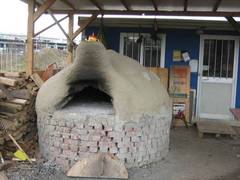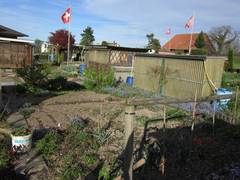Case studies Switzerland
ALLOTMENT GARDEN COMMUNITIES AND THEIR CONTRIBUTION TO NEIGHBOURHOOD DEVELOPMENT
The relationship between Allotment Gardens and the phenomenon of community is rarely studied. In Allotment Garden areas, differentiated and complex communal lives involving specific social practices develop, that in many cases have spanned across generations, and which can be understood as constituting a specific way of everyday life. Recently however allotment gardens in Switzerland are being re-discovered by a new, younger generation of users, who bring in new social practices and ideas of community to the allotment garden areas, initiating transformations within the community as well as potentially changing the role of allotment garden areas for the wider neighbourhood.
By conducting in-depth explorative and ethnographic research of two transforming allotment gardens in the cities of Basel and Bern, the research project analyses how allotment garden communities are being (re-) produced in the studied gardens and how the communities incorporate changes in meaning and function of the gardens brought in by new users. It will also look into the wider context of the neighbourhood and ask which (potential) contribution allotment garden communities play for the surrounding neighbourhood development.
Future Scenarios of Allotment Gardens in the context of increasing urban densification and urban open space policies
Allotment gardens have been scarcely addressed by planning actors. This has recently changed due to the reorganisation of cities as places to live, work, and invest. The corresponding urban growth has led to urban densification and discussions of economically low-value utilisation of urban space. Concurrently, because of new urban life-styles other forms of urban gardening and leisure interests have arisen and questions concerning the future of allotment gardens have been embedded in considerations of the appropriate supply of urban open space. Hence, approaches to allotment gardens and its conditions for transformation have become a central question of urban development policies.
The research project addresses this question by analysing discourses on spatial policies in the context of social change and its implications for allotment gardens and other forms of urban gardening. Planning practices will be analysed in Swiss metropolitan areas to develop future scenarios in densely-developed areas. The results will be delivered to actors in planning and civil society through the implementation of workshops. The outcomes will enrich the discussion in COST Action WG1.
Community Cultivation of a Green City (CCC)
The main comprehensive research question is ‘How do we better comprehend and manage the relevance of Urban Allotment Gardens in Zürich seen in e g social terms’? This qualitative research study contains in-depth- and focus group-interviews as well as on-site observations involving three different existing UAG-projects in the city of Zürich.
Allotment Gardens in Switzerland - a review of the current situation and developments
Allotment Gardens have a long tradition in Switzerland. The emergence of allotment gardens was contextually embedded within the development of the industrialisation and its economic, political, and social changes. Nowadays, despite of its manifold roles and meanings for urban areas, allotment garden areas increasingly yield to make space for housing constructions. At the same time, new forms of gardening in urban areas have emerged such as community, intercultural, neighbourhood and guerilla gardening. Based on document analyses and survey data, the project aims to highlight current developments regarding allotment gardens in Switzerland and to classify different forms of urban gardening such as allotment gardens, community gardens, intercultural gardens, garden co-operations and guerrilla gardening. The objective is to produce a wider framework in the Swiss context in order to fill the lack of primary research on allotment gardens, to embed future research projects and to enhance comparability to other European countries participating in the COST Action TU1201. Within the scope of this project, a table of different types of gardens in the urban area has been developed and legal definitions, descriptions and functions of the garden types have been highlighted.
Allotment Gardens in Basel: Greenfield Development between Entrepreneurial City and Community Governance
Urban development currently undergoes significant changes following the concept of the “Entrepreneurial City” where cities compete with each other for investment and are under pressure to create spaces attractive for further investments. From this standpoint, allotment gardens are seen as valuable land reserve for new constructions. The opposing viewpoint (allotment gardeners, nature groups, etc.) however stresses the importance of allotment gardens as socio-cultural meeting, leisure and natural space. These opposing views create conflicts and new challenges for urban actors. At the same time there is a call for “community-based governance” claiming a more co-produced, locally based urban planning approach. Based on qualitative interviews and workshops, this case study elaborates how the development of allotment gardens in Basel is addressed and discussed by local planners. It analyses the role of different actors involved in the planning process, the strategies and visions they develop regarding allotment gardens and what spatial values underlie these visions. Furthermore, the study aims to point out the role social planning plays in the planning of allotment gardens and how social work may contribute to its development.
Funding: Swiss National Science Foundation (DORE)



